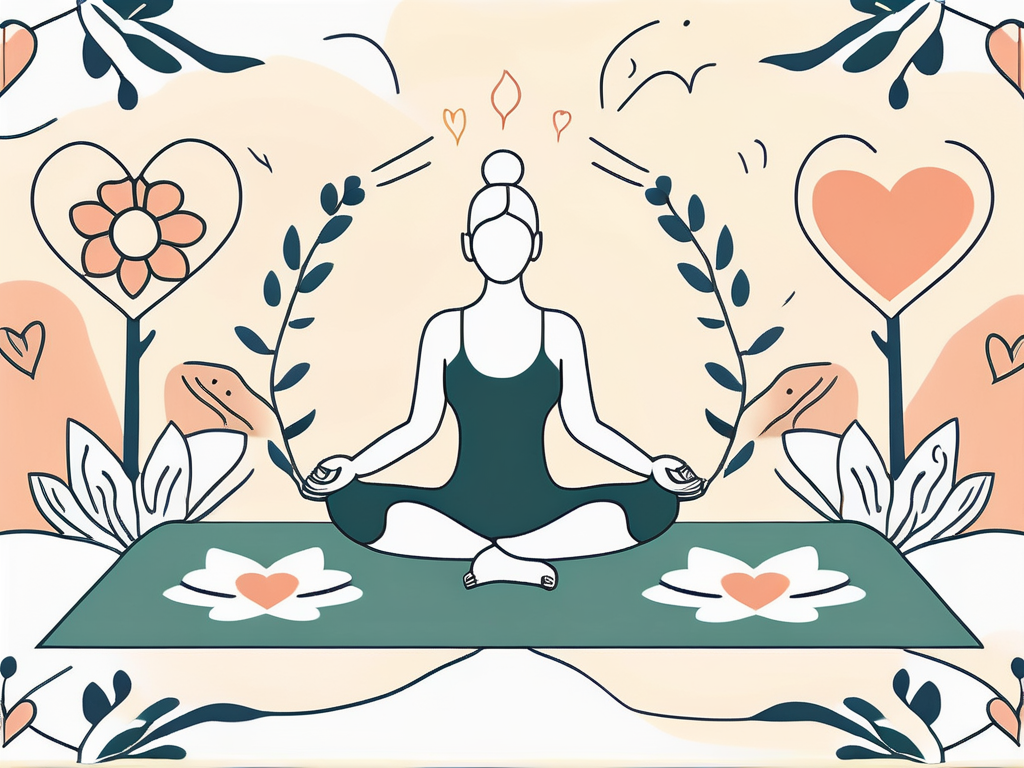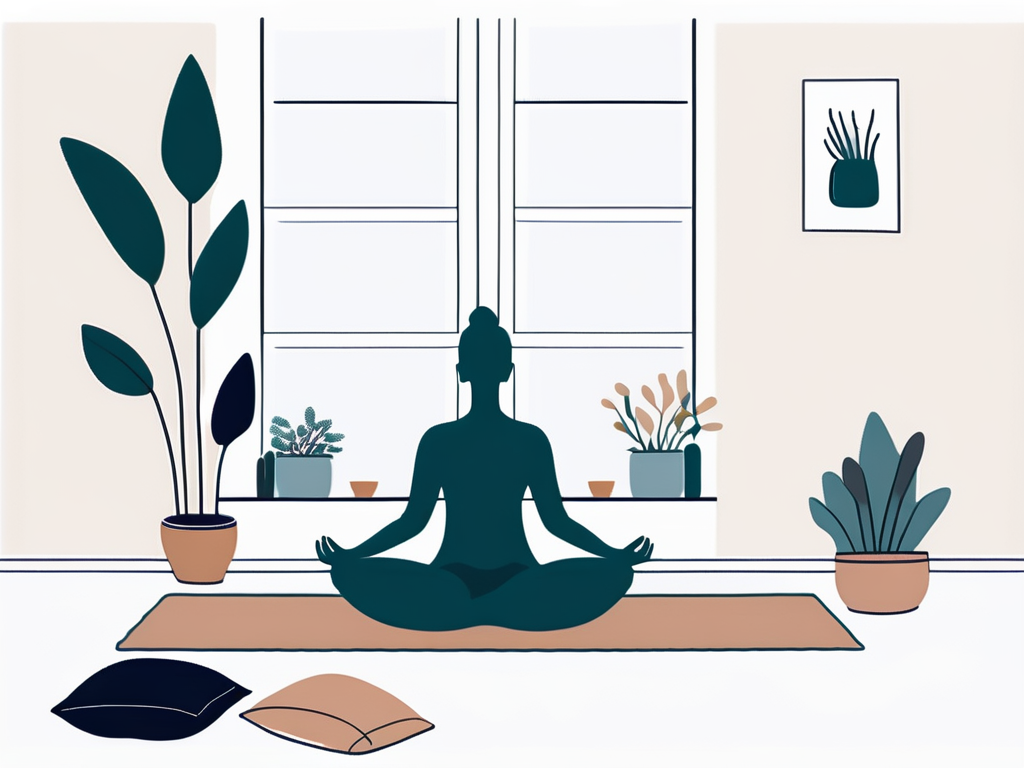Yoga and self-compassion are two powerful practices that can help us cultivate kindness not only towards ourselves but also towards others. In this article, we will explore the connection between yoga and self-compassion, how yoga contributes to emotional well-being, and ways to extend compassion to others through yoga. We will also discuss how to implement yoga and self-compassion in our daily lives, overcoming obstacles along the way.
Understanding the Connection Between Yoga and Self-Compassion
At its core, yoga is a philosophy rooted in self-love and self-acceptance. The practice of yoga encourages us to embrace our strengths and limitations, fostering a sense of compassion towards ourselves. By connecting the mind, body, and breath, we can cultivate a deeper understanding of our own needs and be kinder to ourselves.
When we practice yoga, we create an environment of acceptance and non-judgment. This mindset translates into our daily lives, allowing us to approach ourselves and others with compassion and understanding.
The Philosophy of Yoga and Self-Love
Yoga philosophy teaches us to recognize the inherent goodness within ourselves. It reminds us that we are deserving of love and kindness, just as much as anyone else. Through yoga, we learn to let go of self-criticism and comparison, and instead, focus on nurturing a positive self-image and embracing our unique qualities.
Yoga philosophy also emphasizes the concept of interconnectedness. It encourages us to see ourselves as part of a larger whole, connected to all living beings. This understanding helps us cultivate self-compassion by recognizing that our well-being is intertwined with the well-being of others. When we practice self-love, we contribute to a more compassionate and harmonious world.
How Yoga Encourages Self-Compassion
Yoga offers a variety of practices that promote self-compassion. Mindfulness, a key component of yoga, helps us become aware of our thoughts and emotions without judgment. This awareness allows us to respond to ourselves and others with kindness and understanding, rather than reacting impulsively.
Additionally, the physical aspect of yoga, such as asana (poses), pranayama (breathing exercises), and meditation, provides an opportunity to check in with ourselves and cultivate self-care. These practices help us create a nurturing relationship with our bodies, develop a sense of trust and attunement, and ultimately, foster self-compassion.
Furthermore, yoga teaches us the importance of self-compassion through the concept of "ahimsa," which means non-harming or non-violence. Ahimsa encourages us to treat ourselves with kindness and compassion, extending that same care to others. By practicing ahimsa on and off the mat, we cultivate a more compassionate and loving relationship with ourselves and the world around us.
The Role of Yoga in Emotional Well-being
Emotional well-being is closely tied to self-compassion, and yoga plays a significant role in nurturing our emotional balance. By connecting our breath with movement and practicing mindfulness, we can develop a greater awareness of our emotions and learn healthy ways to regulate them.

Yoga is not just a physical practice; it is a holistic approach to wellness that encompasses the mind, body, and spirit. Through the ancient teachings of yoga, individuals can explore the depths of their emotional landscape and cultivate a sense of inner peace and harmony. The philosophy of yoga encourages practitioners to embrace their emotions without judgment, fostering a sense of acceptance and self-love.
Yoga and Emotional Balance
When we experience emotional imbalances such as stress, anxiety, or sadness, yoga provides a safe space to release and process these emotions. The physicality of yoga allows us to transform stagnant energy and create a sense of ease within ourselves. Regular yoga practice can contribute to emotional resilience and a more balanced state of mind.
Furthermore, the mind-body connection established through yoga practice can help individuals develop a deeper understanding of their emotional triggers and responses. By cultivating this awareness, practitioners can learn to navigate challenging emotions with grace and compassion, leading to greater emotional stability and well-being.
Yoga for Stress Relief and Self-Care
Stress is an inevitable part of life, but yoga offers a valuable tool for managing and reducing its impact. Through gentle movements, deep breathing, and relaxation techniques, yoga helps calm the nervous system and promotes a sense of overall well-being. By prioritizing self-care through yoga, we can better navigate the demands of everyday life with kindness and ease.
Moreover, the practice of yoga encourages individuals to slow down, tune into their bodies, and listen to their inner needs. This mindful approach to self-care not only helps in stress reduction but also fosters a sense of self-compassion and resilience in the face of life's challenges. By incorporating yoga into our daily routines, we can cultivate a sustainable foundation for emotional well-being and lead more fulfilling lives.
Cultivating Kindness Through Yoga Practice
A key aspect of yoga is the cultivation of kindness towards ourselves and others. By incorporating self-compassion into our practice, we can deepen our connection to ourselves and extend that kindness towards those around us.

Yoga Poses for Self-Compassion
Certain yoga poses are particularly beneficial for nurturing self-compassion. Heart-opening poses, such as Camel Pose or Bridge Pose, allow us to access and release emotional tension held in the chest. These poses help us cultivate self-love, openness, and a sense of vulnerability.
Other grounding poses, like Child's Pose or Legs-Up-The-Wall, provide a nurturing space for rest and introspection. These poses encourage us to honor our need for relaxation and self-care, fostering a kinder relationship with ourselves.
Mindfulness and Kindness in Yoga
Mindfulness is integral to the practice of yoga and acts as a gateway to self-compassion. By cultivating a non-judgmental awareness of our thoughts, sensations, and emotions during yoga, we can develop a greater understanding of ourselves. This self-awareness then allows us to approach our practice and our lives with kindness and compassion.
Extending Compassion to Others Through Yoga
Yoga is not only a practice of self-care but also a pathway to embracing others with empathy and compassion. It encourages us to acknowledge the interdependence of all beings and recognize our shared humanity.
Yoga and Empathy
As we deepen our self-compassion through yoga, we naturally become more empathetic towards others. Yoga teaches us to cultivate a sense of curiosity and understanding, enabling us to step into someone else's shoes and offer support and compassion without judgment.
Yoga's Influence on Interpersonal Relationships
By nurturing self-compassion, we become less self-centered and more attuned to the needs of others. When we approach relationships from a place of kindness and understanding, conflicts can be resolved with greater empathy and compassion. Yoga helps us build stronger connections and fosters a more loving and compassionate community.
Implementing Yoga and Self-Compassion in Daily Life
While attending yoga classes or practicing at home is essential, integrating the principles of yoga and self-compassion into our daily lives is where the true transformation occurs.

Creating a Personal Yoga Routine for Self-Compassion
Start by setting aside dedicated time for yoga practice, even if it's just a few minutes each day. Design a routine that incorporates movements, breathing exercises, and moments of stillness. Allow your practice to evolve organically, focusing on self-compassion and self-care.
Remember, the intention behind your practice matters more than the performance. Be gentle with yourself, and let go of any expectations or judgments. Embrace the process of self-discovery and self-compassion through your personal yoga routine.
Overcoming Obstacles to Self-Compassion Through Yoga
Obstacles to self-compassion are inevitable, but with yoga, we can meet them with resilience and understanding. Yoga teaches us to develop patience and perseverance on the mat, which can then be applied to challenges that arise in our daily lives.
Through breath-awareness and mindfulness, we can cultivate self-compassion even during difficult times. Embrace self-acceptance, offer yourself kindness, and know that your yoga practice can be a powerful tool for overcoming obstacles and cultivating compassion.
By intertwining yoga and self-compassion, we open ourselves up to a journey of kindness and understanding. As we cultivate compassion within, we become better equipped to extend that compassion to others. So, let your yoga practice be a catalyst for self-love, empathy, and compassion in your life. Embrace the transformative power of yoga and self-compassion, and may it ripple out into the world, creating a kinder and more connected society for all.




